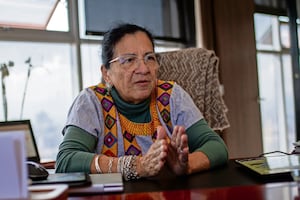Más Información

FGR acusa a María Amparo Casar de uso ilícito de atribuciones por pensión vitalicia; comparecerá en el reclusorio Oriente

“No está en riesgo el derecho a la información”, asegura Nashieli Ramírez Hernández, secretaria general de la Contraloría de la CDMX
Mexican cultivation of opium poppies used to make heroin rose 21 percent from mid-2015 to mid-2017
, a new report showed, possibly reflecting surging U.S. demand for the drug and underscoring the deep security challenges for the incoming Mexican government.
Poppy production rose to an estimated 30,600 hectares (75,600 acres)
by June 2017 from 25,200 hectares (62,300 acres) in June 2015, according to the joint report published on Thursday by the Mexican government and the U.N. Office on Drugs and Crime (UNODC) .
That expanse would cover an area about the size of the U.S. city of Philadelphia.
Mexico is the top source of the heroin trafficked to the United States , which has seen a sharp spike in overdose deaths that have been amplified by the mixing of the powerful synthetic opioid fentanyl with heroin, according to U.S. authorities.
Violent drug gangs have been battling over opium-producing territory in Mexico, where killings have climbed to the highest level seen in records going back to 1997.
The report marks just the second time Mexico has released U.N.-backed data on opium cultivation after an initial report in 2016 that used a different methodology.
In the past, the U.S. government had been skeptical of Mexican drug data.
“This was a big advance,” said Antonino De Leo, the top UNODC official in Mexico . “One of our key tasks everywhere is to build trust between partners.”The U.N.-Mexico report suggested a lower total area of poppy cultivation than data from the U.S. Drug Enforcement Administration , which said in a report issued last month that Mexico’s crop rose to 44,100 hectares (109,000 acres) last year .
De Leo said he could only comment on the U.N. report, which was carried out under the technical guidance of the Vienna-based Illicit Crop Monitoring Program , which has a global mandate to strengthen monitoring around the world.
President-elect Andrés Manuel López Obrador, who takes office on Saturday, has pledged to move away from Mexico’s military-led battle against drug gangs and to attack the poverty that drives many small farmers to grow illegal drugs.
He has pledged to boost development spending in Mexico’s poor south, such as Guerrero state , one of the top opium-producing areas as well one of the most violent.
López Obrador’s pick for interior minister, Olga Sánchez Cordero, has also backed creating a legal market for the medicinal use of poppy crops.
dm
Noticias según tus intereses
[Publicidad]
[Publicidad]













